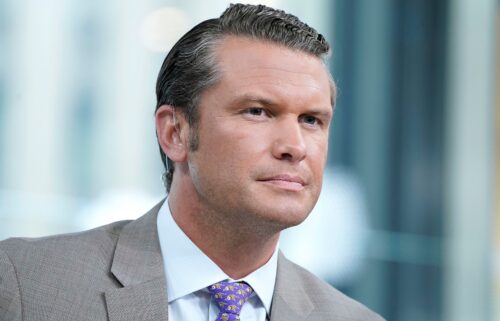Why Wall Street should worry about retail
New York (CNN) — A version of this story first appeared in CNN Business’ Before the Bell newsletter. Not a subscriber? You can sign up right here. You can listen to an audio version of the newsletter by clicking the same link.
Investors are eagerly anticipating Wednesday’s US retail sales report.
That’s because the strength of the US economy rests on the shoulders of consumers, making this among the most important gauges we have. If people are spending money, companies keep employees in their jobs and the cycle goes on.
Consumer spending accounts for about 70% of America’s gross domestic product, the broadest measure of the US economy, so a recession is nearly impossible as long as consumer spending is growing.
And so far, American shoppers have continued to shell out cash for purchases, despite stubbornly high (though waning) inflation and interest rates at 23-year highs.
Wednesday’s report is expected to be a good one — economists polled by FactSet expect that a strong holiday shopping season boosted consumer spending by 0.4% in December from the month prior. That’s on top of a 0.3% increase in November.
But new data from the New York Federal Reserve on Tuesday has soured the mood on Wall Street.
The report showed that Americans have slowed some of their spending and that they expect to pull back a little more. The median increase in monthly household spending slowed to 5.01% on an annual basis in December 2023, down from 5.5% in August 2023 and 7.1% in December 2022, according to the latest Survey of Consumer Expectations Household Spending data.
That’s the lowest reading since April 2021, according to my colleague Alicia Wallace.
The outlook for consumer spending doesn’t look so bright, either. The median expected growth in monthly spending dropped to 3%, the lowest since December 2020.
Survey respondents also said they expected to reduce their spending on essentials like groceries.
A confluence of problems: But just as the retail sector was beginning to normalize — having successfully survived Covid-induced supply chain kinks, shutdowns, persistently elevated inflation and unusually high interest rates — it appears that global instability could once again wreak havoc on shipping and throw the sector for a loop.
Container vessels are now avoiding both the Red Sea and the Suez Canal, as Iranian-backed Houthi fighters attack ships in what they say is retaliation for Israel’s war against Hamas. The Suez is the main route for shipments from Asia to Europe and to the east coast of the US, and rerouting is causing delays and driving up transportation costs.
The World Container Index, a composite index of container freight rates on eight major routes to and from the United States, Europe, and Asia, increased by 15% last week, according to Drewry, a maritime research and consulting firm. It’s doubled since early December.
Those increased shipping costs could get passed on to the consumer, just as inflation rates have started to fall and the Federal Reserve appears ready to lower interest rates.
Yes, but: Still, Bank of America CEO Brian Moynihan believes the consumer will remain resilient.
“We have people who are making money, who are employed. Unemployment is very low, they are getting paid more,” he told CNN’s Richard Quest at the World Economic Forum in Davos, Switzerland this week.
“Inflation is still tough on a lot of them, so you can’t discount that, but on the other hand the stock market being up, they’ve got accumulated wealth, they are making a lot more money,” he said.
Bob Iger made $31.6 million as Disney’s CEO last year
Disney CEO Bob Iger raked in $31.6 million in compensation last year — a multimillion-dollar boost from his income the year before, reports my colleague Samantha Delouya.
Iger’s 2023 pay package included a base salary of $865,385, stock awards totaling $16.1 million, $10 million in stock option awards, $2.1 million in performance-based compensation and $2.48 million in other compensation, according to The Walt Disney Company’s annual proxy statement, which was filed Tuesday.
Despite Iger’s multimillion-dollar paycheck, Disney has faced growing challenges in the past year, including a string of box office flops, declining linear TV viewership and an uneven transition into a streaming future.
In November, Disney said it would slash its expenses by another $2 billion, adding to the $5.5 billion reduction it had previously announced as it looks to rebuild its business in a rapidly changing media environment.
China’s population declines for second straight year as economy stumbles
China reported a record low birth rate in 2023 as its population shrank for the second year in a row.
The trend marked the deepening of a demographic challenge set to have significant implications on the world’s second largest economy, report my colleagues Laura He and Simone McCarthy.
The country recorded 6.39 births per 1,000 people, down from 6.77 a year earlier, China’s National Bureau of Statistics (NBS) announced Wednesday. The birth rate is the lowest since the founding of Communist China in 1949.
The country’s demographic shift comes at a time when its growth is sputtering. The NBS confirmed that China’s economy grew by 5.2% last year, compared to a government target of around 5%.
While this expansion marks a significant pick-up over 2022, when China’s economy grew by just 3%, it is still one of the country’s worst economic performances in over three decades.
The-CNN-Wire
™ & © 2024 Cable News Network, Inc., a Warner Bros. Discovery Company. All rights reserved.

